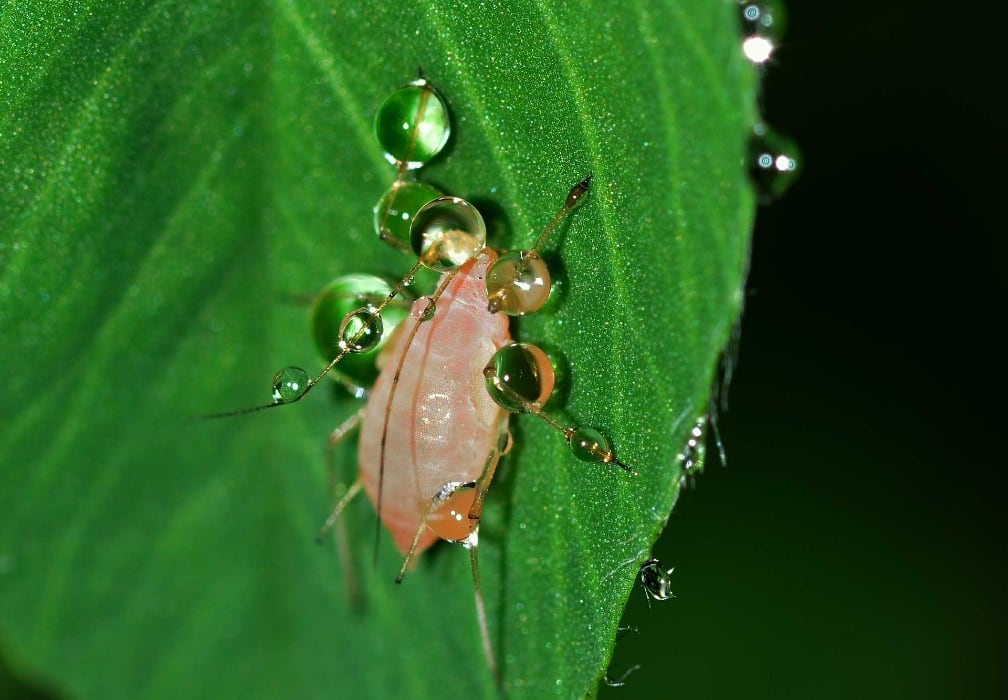Read and Learn More About Pests
The Destructive Aphid Bug: Hire A Pro To Exterminate YoursHowever, the appearance of harmful pests can put all your hard work at risk. Destructive insects such as the aphid bug are both unwanted and a threatening presence in the garden. Aphids are also known as plant lice and are eager to feed on your beloved flowers, vegetable, and other garden plants. So, who are these pests and how can they harm your garden?
Introducing The Aphid
There are about 4,000 aphid species around and the bad news is just about every plant will attract aphids. These tiny pear-shaped, soft-bodied insects can be green, golden, orange, red, brown, black, grey, and even white in color.
They like to feed by sucking the juice out of leaves, stems, and tender plant parts. Some species, however, eat lettuce roots and the woody parts of apple tree limbs and roots. Aphids prefer to feed in dense groups and are slow moving. Generally, they are wingless, though some will grow wings and fly to colonize new plants when they become too crowded.
An Aphid Life Cycle
Most aphids are female and can give birth to live nymphs, so there is no egg stage. An adult female may live for approximately 30 days, during which she can give birth to between 40–100 nymphs. One week is sufficient for young aphids to reach maturity.
Alternatively, there are also winged aphids which do mate and lay eggs in the fall season. Those aphids will overwinter in the egg stage and hatch in the spring to ensure the proliferation of the species.
The aphid’s ability to reproduce easily and quickly over a short period of time makes them difficult to control. In addition, this allows them to develop a resistance to different insecticides. You can find Aphids under curled the leaves of plants where they are hidden from natural predators.
Aphids Can Do Serious Damage

Aphids can be a grave and persistent pest in the garden for several reasons:
- They reproduce rapidly and easily (short life cycle span 1 week from birth to adult maturity)
- Quickly infest and colonize plants in your garden or yard
- Aphids are known to transmit plant viruses as well as inject poisons into plants that distort its growth (gall formations)
- Aphids excrete great amounts of sticky honeydew, allowing the growth of black, sooty mold on plants
- Aphid honeydew attracts ants which results in unattractive clusters of aphids and ants on the plants
- Aphid infestations attack and weaken young sensitive seedlings
- Aphids cause leaf yellowing, curling, and stunt leaf growth on mature plants
- Greatest damage occurring in late spring when temperatures are warm (65–80°F)
Aphid Prevention
Although aphid species are difficult to distinguish from one another, the treatment for most types is the same, so you can apply a universal approach in preventing aphid damage. Here are some preventative gardening approaches to preventing aphid infestations.
- Get Rid Of Mustard And Sow Thistle Weeds
- Aphids are especially attracted to mustard and sow thistle
- Don’t Over Fertilize Your Garden
- Too much nitrogen promotes new leafy growth which is something that also attracts aphids. A better alternative is slow release fertilizers or even compost to nourish your plants
- Make Your Garden Attractive To Aphid-Eating Predators
- By planting flowers that produce nectar (such as cilantro, hyssop, alyssum, etc.) you will attract insects, such as ladybugs, hoverflies, lacewings, and wasps, which love to feed on soft-bodied bugs such as aphids. This will help keep aphid populations in control
- Setting upnesting boxes and bird feeders specifically for insect-eating birds, such as hummingbirds, warblers, nuthatches, and wrens should help to control aphid outbreaks
- Protect Your Seedlings
- By using floating row covers you can create a barrier aphid attacks
- Careful When You Prune
- Don’t prune unless you have already done some of the preventative measures, especially introducing natural aphid predators (i.e. lady bugs, insect-eating birds). Pruning will promote new growth and will attract more aphids to your garden
Monitoring And Maintenance
By taking preventative measures as we’ve listed above, you can help to control aphid populations; however, it’s by no means enough to protect your garden. There are also important steps to regularly monitor and maintain your garden against aphids. This takes a more dedicated approach to gardening. Here are some of the things you’ll need to do to control aphid infestations:
- Monitor Your Plants
- Early in the growing season, check the undersides of leaves and new growth for aphids especially during rapid plant growth stages (minimum twice a week)
- Spraying And Washing
- If you have some aphids (mild infestation), a first step is to just spray them with water to knock them off the plants. They often have difficulty getting back onto the plant. This is an early day ritual so the moisture can have time to dry off during the day
- Another option is to do a homemade anti-aphid spray made of soap and oil. Fill a spray bottle about two-thirds with warm water and add in 1 teaspoon of vegetable oil, 1 teaspoon of mild dish detergent and mix well. This insecticidal soap solution should be sprayed onto areas of the plant that are aphid infested.
- The soap and oil spray cover and coats the aphid’s body and will block their air supply causing them to suffocate. Afterwards, you need to rinse off the solution (3–4 hours later) from the plants with clear water so they aren’t harmed by the soap.You would need to repeat this process in another 5 days if the aphids are still a problem
- Regular Weeding
- Keeping your garden and surrounding areas well-weeded is important to stop aphids from spreading. Keeping sanitary a and neat garden will also help. If you are pruning or removing badly aphid infested plants be vigilant in removing any trimmings after pruning to prevent any aphids accumulating there. Also, disinfect those garden tools in a bleach solution (one part bleach, nine parts water) to ensure none survive on the tools
Getting Professional Help With Aphid Extermination
It does take a fair amount of dedication and attention to keeping those aphids at bay. It’s possible that even after taking preventative steps and being vigilant in your gardening, you may still have a problem with aphids. An aphid infestation is a persistent problem that can be extremely frustrating and disheartening to gardeners.
The application of insecticidal soaps and oils are good choices for many situations but require regular, consistent application because they only kill the aphids present on the day they are sprayed (you’ll be rinsing those plants after 4–5 hours later and thus remove the solution).
This takes a lot of work and consistency. These contact methods in killing aphids are ineffective in the of prevention of damaging aphids such as leaf curl plum aphid or wooly ash aphids because they are shielded from the sprays (hiding under galls or curly leaves).
Also, during warmer weather plants are in a water-stressed state and shouldn’t be sprayed with soaps or oils (they can be phototoxic to the plants). Extra caution is needed under those circumstances. At some point, it may become necessary to seriously consider applying insecticides for aphid extermination.
If so, it would be advised to get professional advice and help. Here are some of the reasons why: Fruit trees need a delayed-dormant application of special insecticides to kill overwintering eggs (during the fall season). Understanding when and how to apply these aphid insecticides can help in giving fruit trees a successful fruit set in the next season.
Specialized insecticides for home garden and landscape aphid control are more effective than soap and oil spray but need careful and skilled application to prevent the damage to natural aphid-eating insects like lacewings, wasps, and ladybugs as well as bees (which may cause other environmental problems).
Systemic insecticides in the protection of woody ornamentals are very effective and are useful for serious infestations of aphids (woolly hackberry aphid, which is resistant to preventative natural control). Applications are usually made in spring when aphids first become apparent.
Again, these are very effective but require a professional and skilled application. Professional applicators (soil injectors) also provide better control with less runoff potential. Ultimately, protecting your garden from the destructive aphid along with having peace of mind is a more than a good reason to hire a professional.
More Pest Control Solutions
Read Reviews
Read reviews by other customers like you.
Research
Tips and articles to help you select a pest control provider.
Find Providers
Find a qualified pest control provider in your area.

